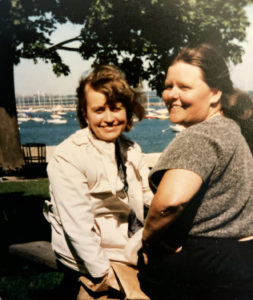

Personal reflection
Vaccines’ impact on our family over the years

Grandma Lillian held her only daughter who stiffened like a board in her arms. In 1920 grandma thought Harriet had died; however, that would happen a few days later when after more suffering her eighteen-month-old child was taken by spinal meningitis.
Though grandma longed for a life-saving meningitis vaccine for the child that never grew to be my aunt, such was not available. However, I have been blessed by a health made possible by vaccines over the years.
In 1798 development for the small pox vaccine began. Seeing the horrific effects on those who had not been vaccinated, in 1905 the supreme court ruled 7 to 2 that the vaccine could be required. The judges ruled that that the common good outweighs individual liberty.
Thanks to that decision, I received a small pox vaccine in the form of a small rapidly poked bubble on my arm. Even today faint scars, on the vaccinated arms of people from my generation, are visible. I for one am grateful for that vaccine reminder of the disease rather than smallpox scars all over my body resembling the clustering of seeds inside a pomegranate.
Diphtheria causes children to grow leathery-like layers inside their breathing tubes. The administration of a vaccine for this disease began in 1926. Since I was born in 1945, I and other children did not have to suffer heartbreaking death by suffocation.
Actually in 1948 the combined vaccine for pertussis, whooping cough and diphtheria protected me from diseases causing among other things lock jaw, apnea, blindness and deafness.
Over the years, I followed advice from the medical experts and took their recommended vaccines. A partial list of vaccines and their positive effects incudes rubella vaccine in 1968 which had I become pregnant would have protected my developing baby from birth defects. I had the measles vaccine in 1968; it may have saved me from an early death.
In 1971 I did not take a vaccine for mumps since I’d had the disease as a child. However, this vaccine protected others who got the disease as adults. It saved them from infertility caused by inflammation of ovaries, testicles and other organs. In 1981 I took hepatitis B which protects me from liver failure and liver cancer. In 1985 a vaccine for haemophiles influenza protects me from meningitis, and spinal cord and brain illness.
As I said this is a partial list which explains why my average life expectancy is almost 83 years. Only with the recent discussion about Covid 19 vaccine have I researched vaccination history and realize how I have taken my vaccine blessings for granted.
Most of all I realize how grateful I am that at 9 years old I got the polio vaccine. What a scary time that was for me. Phyllis a grade school classmate got the disease. As she limped around with her brace, we all were aware of the possibility that we too could have gotten it.
Over the years I frequently had girlfriends out to our family’s farm to ride my horse, Lady. Then I never thought about it, but I now realize how excluded Phyllis must have felt in not being invited to come to the farm. As a septuagenarian with more insight into the breadth of pain from physical challenges I realize I could have figured out a way for Phyllis to have been included. Phyllis reminds me of the aftermath of lifelong limitations with which many Covid survivors now have to live.
Grateful to have been spared from polio and eager to help keep children from getting the disease, my friend Cookie and I went to Central America to give immunizations for polio and DTP in 1975.
That trip stands out as one of the most gratifying experiences of my life. Like today, some of the people didn’t trust the vaccines. We had to enlist the help of the educated spiritual leaders in the community to share their personal stories, verify our trustworthiness, and reinforce the importance of vaccines for the little ones in Nicaragua.
My friend Cookie had polio as a child; so, the children who had suffered polio hurried as best they could to hug her and show deep identification with her. When she traveled in Honduras to give the immunizations, Cookie had to be helped on and off a horse. That incredible effort with her metal brace rubbing her leg raw in the heat underlined her commitment to save others from her pain and suffering.
In Nicaragua I was able walk, take horses and travel by dugout boat. One of my vivid memories is meeting people coming toward me in a boat similar to the one in which I traveled. I realized that the family was going to the community that I had just immunized. I motioned them toward me, and the parents held our two boats together as leaning over the boat edges I gave the child a shot in the rain.
Now the American death toll from Covid 19 is over 712,000 and 99% of those deceased are unvaccinated. Thus, I feel called to share stories from my ancestors and my experiences. I continue to trust the medical community. I count on people who are getting positive results through science. I particularly trust medical opinions of our son, Paul Spellman*. As a graduate of MIT and Stanford, he is heading international research teams with breakthrough advances in cancer research.
Paul I’m sure is aware of instances where better decisions could have been made in the national response to Covid. But without a doubt he reiterates the crucial importance of receiving the Covid 19 vaccine. He supports following directives from the Centers for Disease Control and Prevention which safe guard healthy norms for our land.
Reflecting upon my brief stint as a public health technician makes me identify with doctors, nurses, and all those who are overwhelmed with the current number of covid patients and the resulting lack of space for other needy sick. A dear doctor friend in charge of palliative care and hospice in a Milwaukee area hospital is continually challenged by the risk of keeping herself healthy so she can protect her husband and children when she gets off work. Her recent sadness was to see a formerly vibrant 48-year-old man die with covid.
She is helplessly aghast by families who are angry not because their loved ones have not received the vaccine. She could understand that. Instead, relatives erroneously believe that the hospital is denying life-saving medicines that are being falsely promoted on the airwaves. Families do not believe her when she tells them that the hospital is not allowed to prescribe medicines that have not been shown to be effective.
With humility I ask pardon for my omissions. Over the years, I have failed to acknowledge my gratitude for medical folks and my parents for making sure that I was vaccinated. Through them not only have I been made safe, but I have also been able to help build up communal immunity against horrific diseases.
I regret the consequences of not acknowledging my thankfulness. Had I joined others in giving credit where credit is due, those who doubt the efficacy of Covid 19 vaccines might be motivated to join those of us who do not take our heath for granted. Had I been more vocal in appreciation, doubters might better realize their own vulnerability. Maybe they would open family albums, look long and hard at their forbearers and show loving reciprocity toward the ancestors who made sure their children were vaccinated.
In conclusion, I invite others to join me in telling your stories of gratitude even when you feel you are talking to hearts and minds as stiff as boards. Perhaps a chorus of gratitude will inspire more people to carry on the work of protecting themselves, and safeguarding children and others most vulnerable. Perhaps more personal stories of compassionate vaccinations will expedite commitment to a science-based procedure which has been the law of our land for 116 years.
Dona Palmer 10/9/2021
*Links to Paul’s BIO, research and covid vaccine recommended readings are available upon request.
